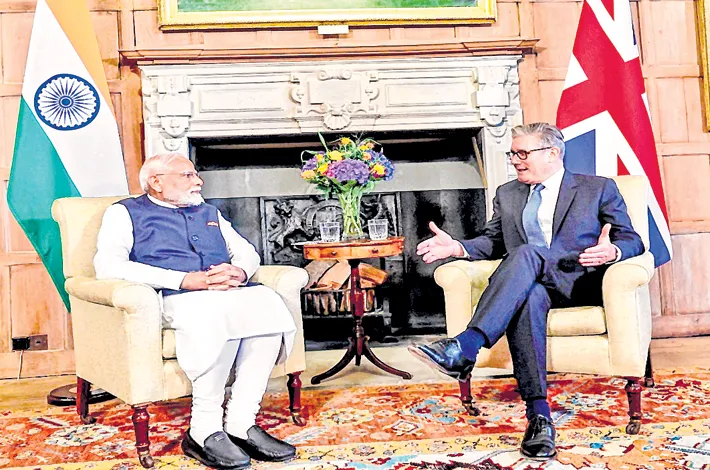India-UK CETA Writes a New Chapter, A Blueprint for Shared Prosperity
28-07-2025 12:00:00 AM

The India-UK historic trade agreement will usher in a new era in the comprehensive strategic partnership and deepen collaboration not only in trade and economy, but also in emerging technologies, education, innovation, and research.
Education Desk Mumbai
India and the United Kingdom have taken a major step in building a stronger economic partnership with the signing of the Comprehensive Economic and Trade Agreement (CETA) on Wednesday, 24 July, 2025. The agreement was signed by Commerce and Industry Minister, Piyush Goyal and Secretary of State for Business and Trade, Jonathan Reynolds in the presence of Prime Minister Narendra Modi and his British counterpart Keir Starmer.
Education was one of the key topics that came under discussion between PM Modi and PM Keir Starmer. The pact is expected to increase trade between the two nations, and higher education will continue to remain in the limelight in future. Marking a major shift in India’s approach to global education partnerships, six UK universities are set to open campuses in India—with the University of Southampton already leading the way. On July 16, it became the first foreign university to inaugurate a campus in Gurugram, Haryana.
“Friends, even in the education sector, both countries together are writing a new chapter,” said PM Modi, addressing the media after the signing ceremony. “Southampton University’s new campus in Gurugram is a proud moment, and five more UK universities will follow.”
The National Education Policy (NEP) 2020 of India, which promotes the internationalisation of Indian higher education, is in line with this educational advancement. It also reflects a larger trend in which India welcomes international educational institutions to increase learning opportunities for students and promote knowledge exchange.
British Council welcomes education focus
Alison Barrett MBE, British Council India Country Director, opined that the education sphere of the UK-India bilateral relationship has emerged as a pillar of strength. “I’m pleased to see education recognised as a core part of the relationship, placing young people from both countries at the heart of this vibrant exchange,” she said. According to Barrett, the action would strengthen ties between institutions in both nations and further the goals of NEP 2020. “This shared vision gives us a strong institutional framework for closer and more effective partnerships,” she added.
The education announcement builds on the Comprehensive Strategic Partnership formed in 2021 between India and the UK, which spans trade, defence, clean energy, and cultural exchange. With British institutions entering the Indian education landscape and a powerful trade pact now in place, the India-UK partnership is moving beyond diplomacy—into classrooms, laboratories, and futures shaped by cross-border learning.
The deal marks a significant milestone in India’s engagement with major developed economies and reflects a shared commitment to strengthening economic integration. As the world’s fourth and sixth largest economies respectively, India and the UK’s bilateral engagement holds global economic significance. The signing of the India-UK CETA follows the successful conclusion of negotiations announced on May 6, 2025. The bilateral trade between the two countries stands at nearly $56 billion, with a joint goal to double this figure by 2030.
The services sector, a strong driver of India’s economy, will also see wide-ranging benefits. The agreement provides greater market access in IT and IT-enabled services, financial and legal services, professional and educational services, and digital trade. Indian professionals, including those deployed by companies to work in the UK across all services sectors, professionals deployed on contracts such as architects, engineers, chefs, yoga instructors, and musicians, will benefit from simplified visa procedures and liberalised entry categories, making it easier for talent to work in the UK.
India has also secured an agreement on the Double Contribution Convention. This will exempt Indian professionals and their employers from social security payments in the UK for up to three years, improving the cost competitiveness of Indian talent.
The agreement has been designed to make trade more inclusive. Women and youth entrepreneurs, farmers, fishermen, startups, and MSMEs will gain new access to global value chains, supported by provisions that encourage innovation, promote sustainable practices, and reduce non-tariff barriers.
CETA is expected to boost trade volumes significantly in the coming years, creating jobs, expanding exports, and supporting a deeper, more resilient economic relationship between India and the United Kingdom. --With inputs from PIB & PTI








